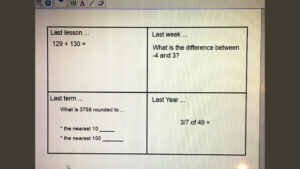

During the academic year 2017/2018, I embarked on a journey towards a mastery curriculum in Maths and documented this in the article, ‘The Journey Towards a Mastery Curriculum’. I have had the opportunity to reflect on the full second year of this approach and the philosophy that underpins a mastery approach.

We celebrated many successes during the first year of this journey: the children’s knowledge of place value increased due to a CPA (concrete, pictorial, abstract) approach; our teachers’ knowledge of pedagogy of mathematical concepts increased; and our children gained a deeper understanding of concepts (due to a longer time spent focusing on these concepts). However, I was concerned that due to the heavy focus on Maths during the academic year, the focus in the subsequent year might shift to other subjects. Would teachers therefore stop developing their own subject knowledge? Fortunately, with the continued support of my Head Teacher and an enthusiastic staff, my worries did not materialise. We continued to build upon the previous year and as teacher knowledge and consistency are integral, we focused on certain areas that required deeper understanding.
Fluency
A continued focus during the past year has been developing the recall of facts. Children do not become fluent unless we teach them strategies as well as returning to these on a regular basis. I am sure that in KS2 classes in schools around the country, there will be teachers pulling their hair out and lambasting the previous teacher saying that the new children in their class cannot do this or that. It is hardly surprising when children are taught something for a week and then do not use that knowledge or skill for a further 6 months. A classic example of this is multiplying and dividing by 10/100 and 1000. This is a skill that was taught well in my school, yet some children were still making errors when completing arithmetic tests further up school. To combat this, we worked hard on developing fluency activities that required children to recall facts and skills that were previously taught further down school. This meant that children were practising and refreshing their knowledge of key learning on a regular basis.
Integrated Learning
As we gained and developed our approaches last year, it became very evident that many concepts in geometry, measurement and statistics rely heavily on place value and calculation. Developing a skill in isolation is important when acquiring a skill; however, if a child cannot apply the skill in a variety of situations, then we might have to re-teach it again when we need it. An example of a mathematical concept we linked was that of area. The skill of multiplication is required to solve area problems and using arrays to deepen the understanding of multiplicative structures is a step we use with children at my school. Therefore, it made sense for us to focus on area problems following the teaching of multiplication methods so that children could apply the skill of multiplication. This was not an isolated example, and the more joint planning I completed with teachers, the more links between mathematical concepts we developed.
Continued Professional Development
Teachers are at the heart of learning, and therefore they should have the skills and understanding to deliver lessons to children. We have continued to delve into mathematical concepts and pedagogy. This continued focus has enabled staff to become skilled at designing lessons that are based on small steps. This ‘small steps’ approach enables all children to access a lesson and ‘keep up’, which is fundamental to a mastery approach. Without careful thought around a concept, including what representations might help understanding, knowledge will only be surface level. Therefore, children will not link learning throughout the lesson and misconceptions can occur. A few weeks ago, I taught a maths lesson about adding 100 to any given number. When I later reflected on the lesson, I realised that as well as moving too quickly, I had made an assumption that the children would transfer the knowledge of multiples of ten from hundred numbers through into the thousands. It is only as we reflect on our practice do we have the time to analyse our own lessons. As a school, we have developed a culture of reflective practice with colleagues to ascertain views on the sequencing of maths lessons. As a mastery lead, I have continued with my journey, through the support of the Maths Hubs and other mastery specialists.
Greater Depth
Throughout the year, many teachers from other schools have conveyed their worries to me concerning the impact of a mastery approach on children targeted for greater depth. My opinion is that by deepening and broadening a child’s experience of a concept, it will help to develop a child’s understanding and enable them to apply this to a range of situations. In terms of Maths results, over the past two years our greater depth results have not dropped but in fact improved However, the most impressive thing for me is that when discussing the performance of ex-pupils with our partner high schools , I have been informed that many of these pupils have demonstrated that they are linking prior learning to what is being taught at secondary school as well as applying the skills they learnt at primary. These early indicators signify that our approach to maths has deepened children’s understanding and is long lasting.
We are presently on our third year of this journey and on reflection, I still see we have much to learn and improve upon, and with the continued support and dedication from my staff, I am sure that our children’s mathematical journey throughout school will continue to be progressive and built on strong foundations.